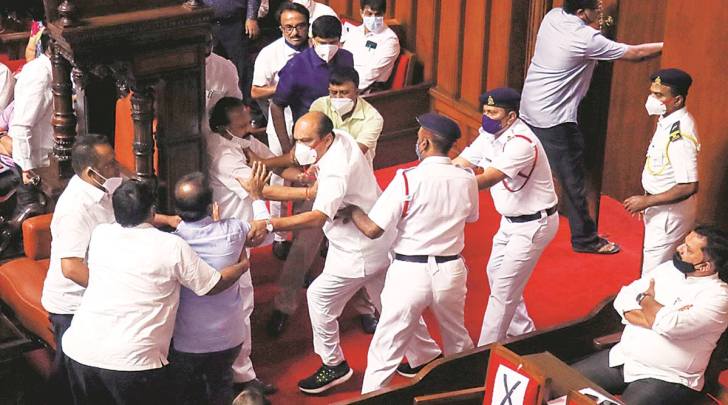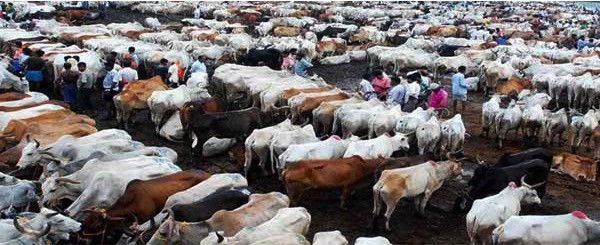Earlier this month, the BJP government in Karnataka passed the controversial Karnatka Prevention of Slaughter and Preservation of Cattle Bill,2020. The bill, which replaces the less-stringent 1964 cow protection legislation that prohibited slaughter of cows in the state, bans the slaughter of cattle, whose definition it has expanded to include “cow, calf of a cow and bull, bullock and he or she buffalo”. The bill, when implemented, will mean a blanket ban on beef in the southern state.
The anti-cow slaughter legislation, which was passed amid loud protests by the Opposition, does not only have harsh provisions — 3-7 years of jail or/and steep fines up to Rs 5 lakh, and sweeping powers to the police — it is also set to have far-reaching adverse economic implications on dairy farmers who are already facing agrarian distress. Industries like leather and hotels are also going to take a huge hit.
Butchers in Shivajinagar beef market in central Bengaluru, which is one of the largest beef markets in the city, are worried. The market supplies meat across the city, from smaller hotels to star hotels, besides getting hundreds of customers who buy fresh meat every day.
Behind the beef market is a small lane that leads to the office of Beef Merchants’ Association of Karnataka, where Khasim Aijaz Quraishi, the president of the association, is in a meeting with the members. The bill, if implemented, Quraishi told Indianexpress. will impact the livelihood of more than 40 lakh people in the state who are dependent on beef and related trade.
Quraishi believes this is a politically motivated bill. “The government says they will protect cows, but see the condition of cow shelters. Cows are suffering and dying there.”
The 2020 Bill is a harsher version of a law passed by the BJP in 2010 with BS Yediyurappa as chief minister. It aimed at banning all forms of cattle slaughter by recommending stringent penalties for violators. The bill was shelved in 2013 by the Siddaramaiah-led Congress government after it failed to get the Governor’s assent.
The Congress had then reverted to the Karnataka Prevention of Cow Slaughter and Preservation of Animals Act, 1964, which banned killing of any cow or calf of she-buffalo. It, however, had certain relaxations — like it allowed slaughter of bullock, buffalo-male or female if it was certified by a competent authority to be above the age of 12 years, incapacitated for breeding or deemed sick.
Rushtum Shafiylla, secretary, Beef Merchants’ Association of Karnataka, said: “We follow the 1964 Act and have never indulged in slaughtering cows. Bullocks and buffalos aged above 12 years are slaughtered in the presence of veterinarians deputed by the Animal Husband Department or BBMP local civic body.”
Quraishi also highlighted that beef is consumed by a large number of people from low-income groups for its nutritional value, especially protein. “Beef is poor people’s meat since they cannot afford mutton and chicken. Not just Muslims, a large section of Dalits and Christians consume beef.” According to Quraishi, people from the upper caste community come to Shivanagar market to trade in skin and bones of cattle.
Another butcher, Mumhamad Riaz Ahmad, said that only 30 per cent of those who buy beef from him are Muslims while the rest are from other communities.
Many believe the bill only has political motives and will lead to polarisation. Speaking to indianexpress.com, a vendor in the market, Masood Ahmad, said, “The government’s intention to ban beef is politics. It will fan communal tensions. Poor people like us only know this job and we will lose our livelihood if this act comes into force.”
Demanding a total ban on cow slaughter in the state, the BJP cow protection cell in the state had written to CM Yediyurappa seeking the reintroduction of the 2010 Bill. Meanwhile, days before the winter session began on December 7 in Karnataka’s Vidhana Soudha, Minister for Animal Husbandry Prabhu Chauhan constituted a committee to study similar stringent laws in place in Gujarat and Uttar Pradesh.
Apart from butchers, the small hotel industry, especially in and around the Shivajinagar area, is unlikely to survive the ban. The owner of New Hilal restaurant in Shivajinagar said, “See our hotel menu, most of the dishes are beef-based. There are more than 30 restaurants that are known for beef dishes. What will they serve in case of a beef ban ? More than 100 people, who are working and running hotels in this area, will be on the streets.”
Labelling the anti-cow slaughter bill as “anti-farmer”, the Karnataka Rajya Raitha Sangha president Kodihalli Chandrashekar said: “After a cow or buffalo stops producing milk, farmers usually sell them as it is a burden to maintain unproductive cows. We farmers are ready to look after our cattle but we want the government to introduce an insurance scheme so that when our cattle die we are compensated.” Yediyurappa has said the state would build gaushalas (cow shelters) in all districts to look after ageing cows once the Bill becomes a law.
Opposing the bill, former Karnataka CM HD Kumarawamy had tweeted: “… the Bill forces farmers to nurture them. But it is highly impossible as the hybrid varieties like HF cattle need a minimum of Rs 200 a day for maintenance. This is highly impractical.
Another ancillary trade that is extremely wary is tannery. Shaik Zakeer, who owns a tannery on Tannery Road in Frazer town area, said: “There are around 10 tanneries left in the area after the 1964 Act was introduced. Now. if the government introduces a new bill, they will also shut shop. There is zero doubt about it. Around 50 families may lose their source of earning.
While tanneries are largely owned by Muslims, the labour consists of Tamil Dalits. “Hides from here are sent to Tamil Nadu leather industry and other parts of the country,” said Zakeer.
The BJP government may promulgate an Ordinance to bring the bill into force after the legislation, which was cleared by the assembly on December 9 , hit a roadblock in the legislative council on the next day. The government had deferred tabling the Bill amid apprehensions that it may be defeated or referred to a select committee on the demand of a combined opposition.
On December 15, the bill was listed to be tabled in the Legislative Council, where the ruling BJP does not enjoy a majority. That was not to be. The Council witnessed high drama with members hurling abuses and the Deputy Chairman being pulled down from his seat over a row pertaining to no-confidence motion. The Council was adjourned sine die within minutes after it met for the day. BJP, Congress MLCs clash in the Karnataka Legislative Council (PTI)
BJP, Congress MLCs clash in the Karnataka Legislative Council (PTI)
Speaking to indianexpress.com, Vinisha Nero, the nominated Anglo-Indian legislator in Karnataka Assembly, said it is not the food habit but the economic fallout of the bill that is the larger concern. “We absolutely do not have an objection to the existing 1964 Act, we respect everybody’s sentiments, but food habits are only a very small part of this bill and for our community. We are more concerned about the farmers and the economic impact on them. Then, what about the wild animals in zoos? Government can’t just snatch away people’s livelihoods.
“The government has to have a proper discussion and planning before bringing such bills,” she added.
Shaji T. Verghese, president of Christian Seva Sangha in Bengaluru, said the beef ban will lead to black marketing. “In middle and lower-middle class Christian community, beef is a staple food. We don’t consume cow which gives milk, the buffalo and bull are food crop and it is a common food in the community.”
Experts have also voiced concerns regarding the bill, saying if the bill is implemented, there will be huge crises in the agrarian economy of the state. Prakash Kammardi, former chairman, Karnataka Agricultural Prices Commission, and retired professor of Agricultural Economics from the University of Agricultural Sciences, Bengaluru, said: “Farmers will be most affected since they are the primary stakeholders. They can’t keep the cow or buffalo when it becomes unproductive, and if the government forces them to keep unproductive cattle, they can’t invest in new ones for dairy products or for farming. This will make other secondary stakeholders, like butchers and people from the leather industry or people who depend on products of cattle. They all come under agrarian economy as the base of these industries are cattle. Those employed in each of these industries will suffer acutely.”
Source : Written by Darshan Devaiah BP in Indian Express Dec 20th 2020

